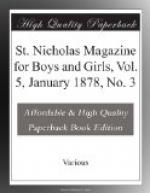“I have received the handsome photograph sent me, and recognize the features of a fine young lad, who has before him every opportunity to grow up a man of fine physique, with a mind cultivated to meet whatever vicissitudes and opportunities the future may present. Many boys in reading history have a feeling of regret that their lives had not fallen in some former period, replete with events of stirring interest, such as our Revolutionary War, or that in Mexico, or even the Civil War, wherein they feel that they might have played a conspicuous part.
“Don’t you make this mistake. The next hundred years will present more opportunities for distinction than the past, for our country now contains only forty millions of people, which will probably double every thirty-three years, so that if you live to three score years and ten you will be a citizen of a republic of two hundred millions of people. Now, all changes are attended by conflict of mind or of arms, and you may rest easy that there will be plenty for you to do, and plenty of honor and fame if you want them. The true rule of life is to prepare in advance, so as to be ready for the opportunity when it presents itself.
“I surely hope you will
grow in strength and knowledge, and do a
full man’s share in
building up the future of this country, which
your fathers have prepared
for you.
“Truly your friend,
“W.T. SHERMAN, General.”
* * * * *
No doubt many of our readers have read some of the poems of Charles and Mary Lamb, and all who have will be interested in the following news concerning one of their books. In 1809 they published a little volume of “Poetry for Children,” but only a few copies were printed, and these were soon out of print, so that the book has long been considered lost to the world. It was recently discovered, however, that the little book had been reprinted in Boston in 1812, and the only two copies of this edition known to exist in this country have lately come into possession of Messrs. Scribner, Armstrong & Co., who intend to republish the volume this fall. The book contains many delightful little poems for boys and girls, prettily rhymed, and full of the quaint humor and conceits which mark the other writings of the authors. We should like to print several of them, but have only room for these:
THE YOUNG LETTER-WRITER.
Dear Sir, Dear Madam, or Dear Friend,
With ease are written at the
top;
When these two happy words are penn’d,
A youthful writer oft will
stop,
And bite his pen, and lift his eyes,
As if he thinks to find in
air
The wish’d-for following words,
or tries
To fix his thoughts by fixed
stare.
But haply all in vain—the next
Two words may be so long before
They’ll come, the writer, sore perplext,
Gives in despair the matter
o’er;




